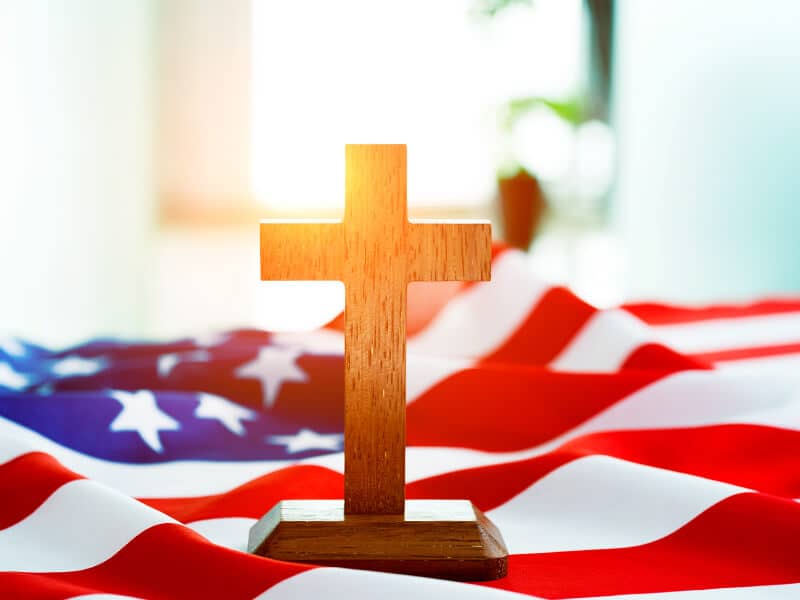The relationship between Church and State has always been a delicate matter. History has seen experimentation with many possibilities, and the truth is that none have really worked. There is too great a variety of religious views among the governed and the governing. Looking at our own faith, Christ never set up a system of governance, but rather acknowledged that there is Caesar and there is God, and that we owe a different kind of obedience to each. Neither is there any one system of governance, be it monarchy, democracy, plutocracy, or theocracy, which the Church would sanction as such to be the Christian way of establishing and maintaining a state. It is also quite evident that, given history, geography, and culture, different kinds of government are appropriate in different places. The Church isn't non-committal in this sphere; it has taken stands against forms of government, such as totalitarian dictatorship or anarchy, which are unacceptable to Christianity. But Christians are not ipso facto socialists, capitalists, or monarchists. And much as we Americans are accustomed to the logic of democracy, democracy is neither the way in which the Church governs itself, nor is it the only or the obvious Christian kind of state government. Christians are Christians, and that makes us people who have to decide in each particular case what best meets the criteria of Christian life. 2. To Vote or Stay Home?
The canons which forbid an ordained person from holding public office indicate the Church's ambivalent relationship to government. The Church is aware of the inevitable conflicts of interest that arise when a visible representative of the Church is asked to represent an electorate of diverse religious and moral principles. But does this ambivalence mean that we should keep out of the process entirely? The answer to that question will not be the same for everyone. All of us are called to be "not of this world" and yet also to be "in the world," and the way in which those two are balanced in our own lives will vary. Monastics have a particular vocation, a particular way of consecrating their lives, and a particular kind of obedience which will in most cases lead them away from voting, even if they may be very much involved in other aspects of contemporary life and society. Some outside the monastic life opt out of the process as well, either because they feel the candidates are unacceptable, or out of principle. Whether we vote or not, our decision must be conscious and deliberate, and the result of prayerful consideration. Orthodox Christians are called to take a stand on matters that affect how people live and how they are treated, and on how the natural world is treated. We are called to care about, to arrive at, and defend principles in terms of our fundamental beliefs. 3. How to Vote?
The question of whether to vote is much easier to address than the question of how to vote. Part of our problem here is the nature of the options before us. a. Liberal and Conservative
Politically as well as theologically, many conservatives will use "liberal" as a swear-word, and many liberals return the favor. We Orthodox Christians often consider ourselves to be a conservative church - and so we are, when we compare some of our theological and ethical principles to others. Our key doctrines about God and about Christ, as well as our positions on human life and human sexuality, are based on principles whose absolute and unchanging character are repulsive to some other Christians.
This still leaves the question of how we are to position ourselves politically. And here we are placed in a serious bind for two reasons. One is that there are some questions for which Orthodox Christians are so far unable to identify a single right answer. For example, we have been divided as to how to approach the war on Iraq, and both sides have offered sound theological arguments. We do not often take two sides of the same fence, but the living character of our Church does allow it to happen. The bigger reason for our difficulty in siding with one or another political party is that the parties today each advocate unacceptable positions alongside admirable ones. Considering the sanctity of life and the dignity of the human person, it is not at all clear which party has a better platform. We must consider their positions not only on abortion, but also on capital punishment, war, and human rights. We need to look at each party's position on education and the environment. Each party must be examined in terms of how wealth is distributed, especially in terms of what effects will be felt by the nation's poor. We need to examine the candidates' views on ethical and bioethical issues such as stem-cell research, euthanasia, HIV/AIDS, and same-sex marriage. Neither party has a monopoly on life and family values: both parties are inconsistent in both areas.
The voting Orthodox Christian today is effectively stuck being either a "Reluctant Republican" or a "Reluctant Democrat." We are, as is often the case, left with a choice between the lesser of two evils. This doesn't take us off the hook, for we must choose. We have a compass to guide us in our choice and that compass is our understanding of Christ's Gospel and how it is lived in the world.

